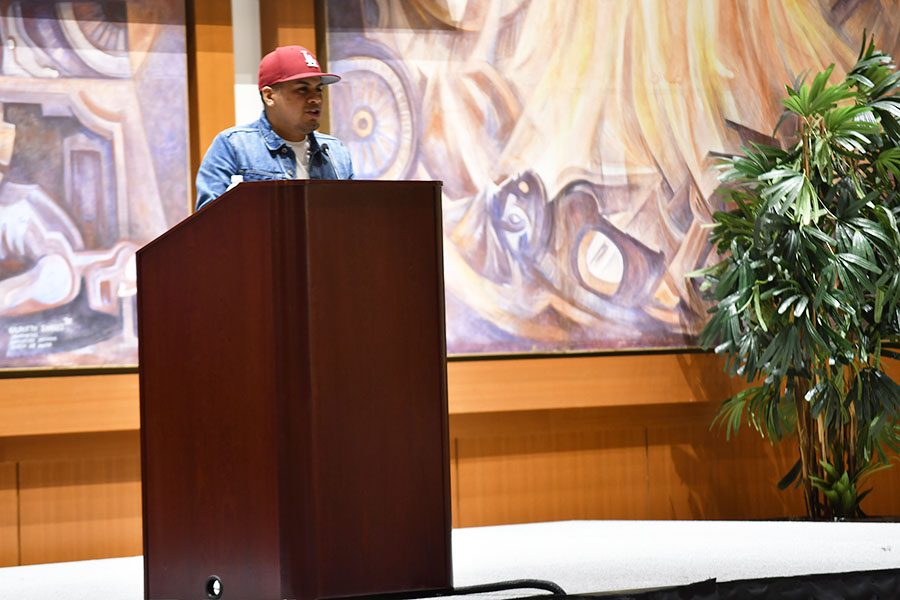This semester, the Latin American Studies Student Association and the Center for Latin American Studies curated a four-part series titled “Undocu Series.” In its third event titled “Activism Through Art,” two artists shared their experiences being queer, undocumented and unafraid.
Second year Latin American studies and public health graduate Mireya Mateo Gomez, treasurer for LASSO, formulated the proposal to receive funding from San Diego State’s Student Success Fee. She believed creating a series about the undocumented community, featuring undocumented people, was necessary to encourage dialogue.
Since the Student Success Fee has no limit on the number of event proposals a student or organization can submit, Gomez brainstormed away, trying to incorporate as many topics pertaining to the undocumented community.
Gomez felt there needed to be at least one event within the series that discussed activism for the undocumented community in an approachable way.
“I feel (art) is one form of expression to bring into light the sensitive conversation and sensitive topic of immigration that’s in a way not so upfront with the issue,” she said.
The two guest speakers, Julio Salgado and Yosimar Reyes, are both nationally acclaimed artists, undocumented and queer. They regularly work together, using their creativity and humor to counter the narratives told about undocumented people in the media.
“One of the biggest things right now is when journalists want to interview you, they kind of want to see your sad story,” Salgado said.
Salgado is a visual artist and California State University Long Beach alumnus with a degree in journalism. According to Salgado, these narratives portrayed in the media are unrealistic and renders a one-dimensional understanding of undocumented people.
“I’m f–king tired of crying,” he said. “I think humor and being realistic of our experiences (in the U.S.) is really important.”
Through his visual art, Salgado seeks to humanize the undocumented community rather than create images replicating the same sad sentiments.
Similarly, Reyes is a writer, poet and San Francisco State University alumnus and creates media for undocumented people to consume and reflect upon.
“Oftentimes, the narrative of who we are as (undocumented) are very gloom and doom and for me, after Trump got elected, I was like ‘damn they really don’t like us here,’” he said. “I really wanted to shift in my perspective and do work that really talks and speaks directly to undocumented people.”
Reyes performed an excerpt from “Prieto,” his autobiographical one-man show, sharing his experiences growing up queer, undocumented and poor in East San Jose after immigrating from Guerrero, Mexico as a child.
Salgado and Reyes create media for Dreamers Adrift, a media platform led by undocumented creatives with the goal of taking back the undocumented narrative through various art forms, according to their website. Salgado is co-founder of the platform, along with three other undocumented individuals.
After Donald Trump was elected president in 2016, Salgado recollects people asking if he, as an undocumented and queer person of color, was afraid. He explained he would not let a new administration hold him back.
“I’ll be damned if I have to go back into a closet, whether it’s a queer closet, because yeah I’m a little queer, a lot queer, or if I’m undocumented,” he said.
Sociology junior Bianca Herrera was familiar with Reyes and Salgado’s work, but appreciated LASSO creating this event to bring them and speak about critical issues.
“It’s really important work that (LASSO) is doing, not only because it encourages undocumented students to pursue their goals in similar fields, (but it) shows them success is possible,” she said. “It also helps the greater population, that might not be undocumented, to be exposed to different narratives that we’re constantly hearing.”
Both Gomez and Herrera hope resources for undocumented students can expand. With new SDSU President Adela de la Torre stepping in this summer, they hope she takes action to support and help the undocumented community on campus.
The speakers ended off on a promising note, reassuring undocumented people they are not alone and artists like themselves are working to take power back in their narratives.
“No one’s going to step up for (undocumented people) the way other undocumented people are going to step up for us, so let’s start owning that power and just be fabulous and amazing. If you ever feel consumed by everything that’s in the media, just watch a pan dulce video,” Reyes said as he closed the Q&A portion.
The final Undocu Series event will discuss tools for work authorization and the barriers undocumented people face. The event’s location, date and time is yet to be determined.







